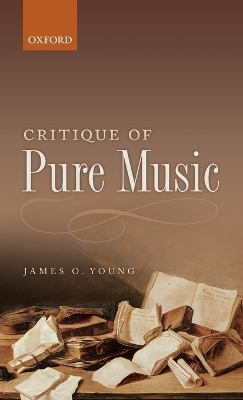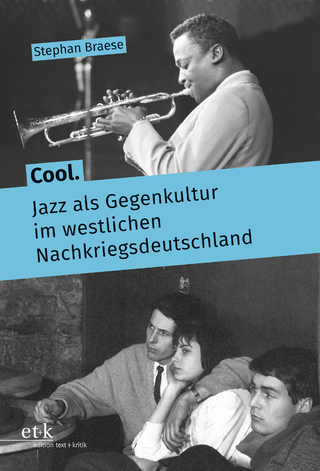
Critique of Pure Music
Seiten
2014
Oxford University Press (Verlag)
978-0-19-968271-3 (ISBN)
Oxford University Press (Verlag)
978-0-19-968271-3 (ISBN)
James O. Young seeks to explain why we value music so highly. He draws on the latest psychological research to argue that music is expressive of emotion by resembling human expressive behaviour. The representation of emotion in music gives it the capacity to provide psychological insight--and it is this which explains a good deal of its value.
Why do we value music? Many people report that listening to music is one of life's most rewarding activities. In Critique of Pure Music, James O. Young seeks to explain why this is so. Formalists tell us that music is appreciated as pure, contentless form. On this view, listeners receive pleasure, or a pleasurable 'musical' emotion, when they explore the abstract patterns found in music. Music, formalists believe, does not arouse ordinary emotions such as joy, melancholy or fear, nor can it represent emotion or provide psychological insight. Young holds that formalists are wrong on all counts. Drawing upon the latest psychological research, he argues that music is expressive of emotion by resembling human expressive behaviour. By resembling human expressive behaviour, music is able to arouse ordinary emotions in listeners. This, in turn, makes possible the representation of emotion by music. The representation of emotion in music gives music the capacity to provide psychological insight-into the emotional lives of composers, and the emotional lives of individuals from a variety of times and places. And it is this capacity of music to provide psychological insight which explains a good deal of the value of music, both vocal and purely instrumental. Without it, music could not be experienced as profound. Philosophers, psychologists, musicians, musicologists, and music lovers will all find something of interest in this book.
Why do we value music? Many people report that listening to music is one of life's most rewarding activities. In Critique of Pure Music, James O. Young seeks to explain why this is so. Formalists tell us that music is appreciated as pure, contentless form. On this view, listeners receive pleasure, or a pleasurable 'musical' emotion, when they explore the abstract patterns found in music. Music, formalists believe, does not arouse ordinary emotions such as joy, melancholy or fear, nor can it represent emotion or provide psychological insight. Young holds that formalists are wrong on all counts. Drawing upon the latest psychological research, he argues that music is expressive of emotion by resembling human expressive behaviour. By resembling human expressive behaviour, music is able to arouse ordinary emotions in listeners. This, in turn, makes possible the representation of emotion by music. The representation of emotion in music gives music the capacity to provide psychological insight-into the emotional lives of composers, and the emotional lives of individuals from a variety of times and places. And it is this capacity of music to provide psychological insight which explains a good deal of the value of music, both vocal and purely instrumental. Without it, music could not be experienced as profound. Philosophers, psychologists, musicians, musicologists, and music lovers will all find something of interest in this book.
James O. Young is Professor of Philosophy at the University of Victoria, Canada. He is the author of Global Anti-realism (Avebury, 1995), Art and Knowledge (Routledge, 2001), Cultural Appropriation and the Arts (Wiley-Blackwell, 2008), and more than fifty articles in refereed journals. He is the editor of Aesthetics: The Critical Concepts (Routledge, 2005) and (with Conrad G. Brunk) The Ethics of Cultural Appropriation (Wiley-Blackwell, 2009).
1. Music and Expressiveness ; 2. Music and the Arousal of Emotion ; 3. The Content of Music ; 4. Music and Lyrics ; 5. The Value of Music ; Bibliography
| Erscheint lt. Verlag | 9.1.2014 |
|---|---|
| Verlagsort | Oxford |
| Sprache | englisch |
| Maße | 145 x 223 mm |
| Gewicht | 406 g |
| Themenwelt | Kunst / Musik / Theater ► Musik ► Musiktheorie / Musiklehre |
| Geisteswissenschaften ► Philosophie | |
| Geisteswissenschaften ► Psychologie | |
| ISBN-10 | 0-19-968271-2 / 0199682712 |
| ISBN-13 | 978-0-19-968271-3 / 9780199682713 |
| Zustand | Neuware |
| Informationen gemäß Produktsicherheitsverordnung (GPSR) | |
| Haben Sie eine Frage zum Produkt? |
Mehr entdecken
aus dem Bereich
aus dem Bereich
Grundbegriffe, Harmonik, Formen, Instrumente
Buch | Softcover (2021)
Philipp Reclam (Verlag)
7,80 €
Jazz als Gegenkultur im westlichen Nachkriegsdeutschland
Buch | Hardcover (2024)
edition text + kritik (Verlag)
42,00 €


